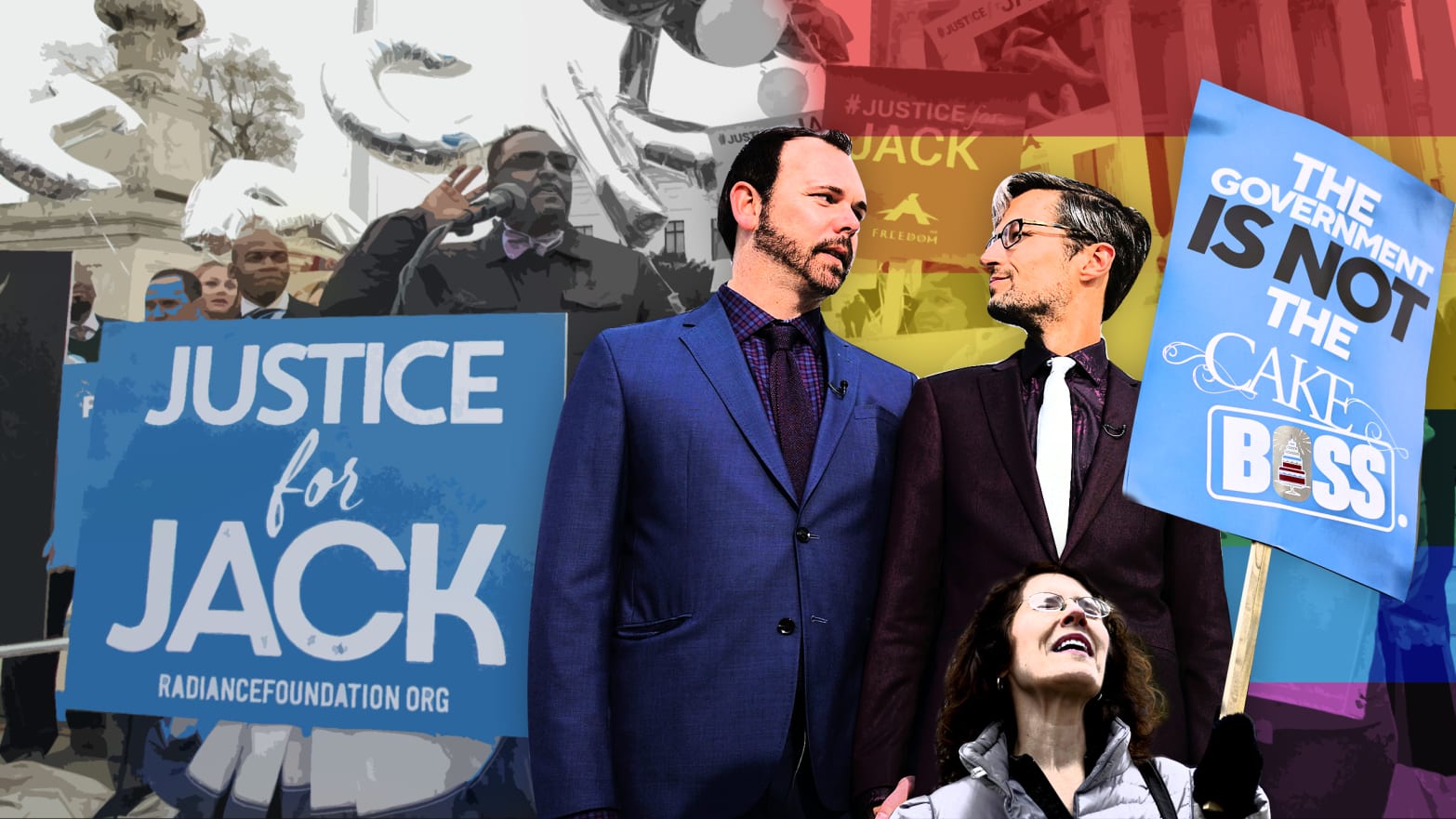Two lesbians named Rachel walk in to a wedding cake shop to plan for their upcoming nuptials.
After learning that the cake will be for their own wedding, the baker refuses service.
Offended, the couple can’t believe the guy is so opposed to gay marriage, he won’t even bake a cake.
The baker replies, “No, no. I’m fine with gay marriage – I just can’t support inter-Rachel marriage.”
If a “Christian” car dealer
sells a happy gay couple
a sparkling pink Miata
and the effervescent gays
hit a plodding pedestrian
and drive off
without even slowing –
they did look back –
is the dealer liable
for a criminal hit-and-run?

I saw a meme – if selling a gay couple a wedding cake means a baker supports the marriage, does selling a gun engraved “I want to kill my landlord” mean the gun shop owner supports the murder? This was attributed to Democratic Senator Diane Weinstein. No relation to Harvey.

A dissenting opinion written by Justice Ruth Bader Ginsburg and joined by Justice Sonia Sotomayor argued that the Jack cases and Phillips’ case aren’t comparable because Phillips was asked to make a cake just like any other.
“The bakers would have refused to make a cake with Jack’s requested message for any customer, regardless of his or her religion. And the bakers visited by Jack would have sold him any baked goods they would have sold anyone else. The bakeries’ refusal to make Jack cakes of a kind they would not make for any customer scarcely resembles Phillips’ refusal to serve Craig and Mullins: Phillips would not sell to Craig and Mullins, for no reason other than their sexual orientation, a cake of the kind he regularly sold to others. When a couple contacts a bakery for a wedding cake, the product they are seeking is a cake celebrating their wedding—not a cake celebrating heterosexual weddings or same-sex weddings—and that is the service Craig and Mullins were denied. … Jack, on the other hand, suffered no service refusal on the basis of his religion or any other protected characteristic. He was treated as any other customer would have been treated—no better, no worse.”
From John Corvino, New York Times, November 27, 2017. [harshly edited]
One might better appreciate Phillips’s position by considering a second case. In 2014, not long after the commission announced its Masterpiece decision, William Jack attempted to buy a cake at Azucar Bakery in Denver, Colo. Specifically, he requested a Bible-shaped cake decorated with an image of two grooms covered by a red X, plus the words “God hates sin. Psalm 45:7” and “Homosexuality is a detestable sin. Leviticus 18:22.” The owner, Marjorie Silva, refused to create such an image or message, which conflicts with her moral beliefs. She did, however, offer to sell him a Bible-shaped cake and provide an icing bag so that he could decorate it as he saw fit. The customer filed a complaint alleging religious discrimination, which is also prohibited by Colorado’s public accommodations law. But the commission disagreed, arguing that Silva’s refusal was based not on the customer’s religion, but on the cake’s particular message.

Stutzman’s case was called Arlene’s Flowers, Inc., v. Washington.
“I serve everyone in all walks of life, and I had the privilege of serving Rob, longtime customer for almost 10 years, for birthdays and anniversaries, custom-making arrangements for him,” Stutzman said in a 2019 interview with “Fox & Friends,” referencing Robert Ingersoll, the gay man who asked her to create floral arrangements for his wedding.
“But when he came in to talk to me about his wedding, I just simply put my hands on his and told him I could not do it because my relationship with Jesus Christ,” Stutzman said. “Without any complaint Rob or [his partner], the attorney general of Washington sued me personally and corporately simply because I have a different viewpoint on marriage.”
Therein lies the crucial difference between the cases: Silva’s objection was about what she sold; a design-based objection. Phillips’s objection was about to whom it was sold; a user-based objection. The gay couple never even had the opportunity to discuss designs with Phillips, because the baker made it immediately clear that he would not sell them any wedding cake at all. Indeed, Masterpiece once even refused a cupcake order to lesbians upon learning that they were for the couple’s commitment ceremony.
Business owners generally have wide discretion over what they do and do not sell: A vegan bakery needn’t sell real buttercream cakes. A kosher bakery needn’t sell cakes topped with candied bacon, or in the shape of crosses. By contrast, business owners generally do not have discretion over how their products are later used: A kosher bakery may not refuse to sell bread to non-Jews, who might use it for ham-and-cheese sandwiches.
(Of course, there are times when the buyer’s identity or the intended use is legally relevant. It is permitted — indeed, required — to refuse alcohol to minors, or torches to someone who announces that he is about to commit arson. But that legal concern does not apply here.)
